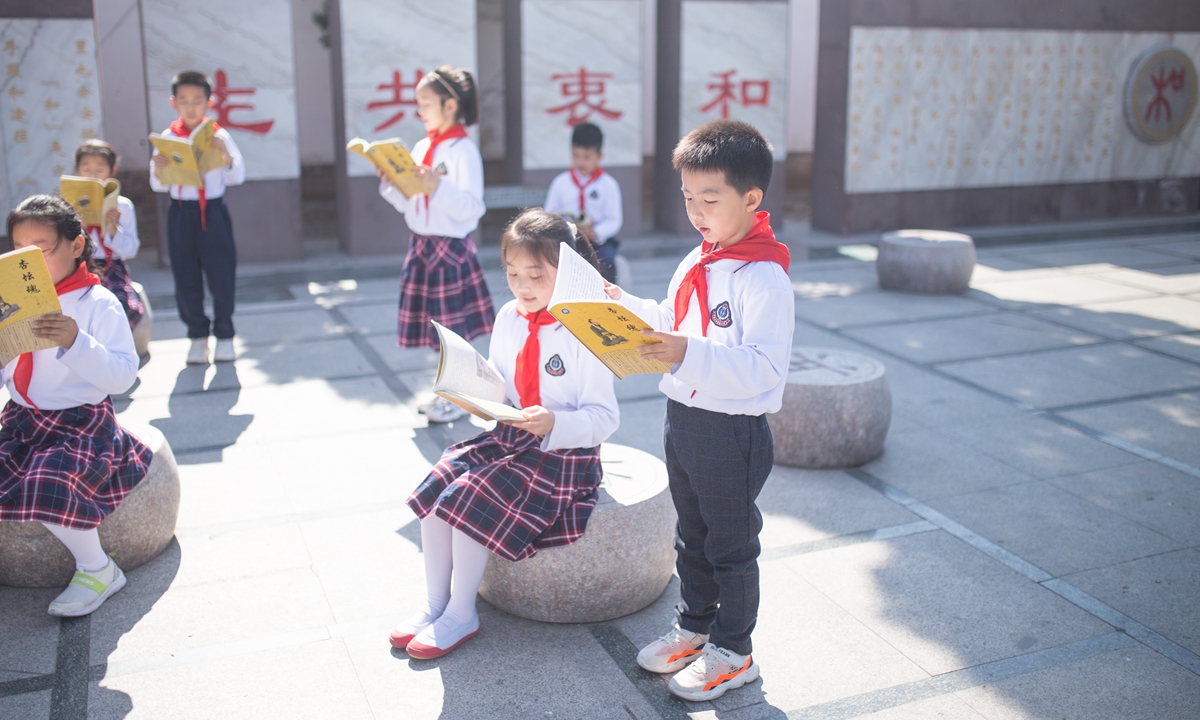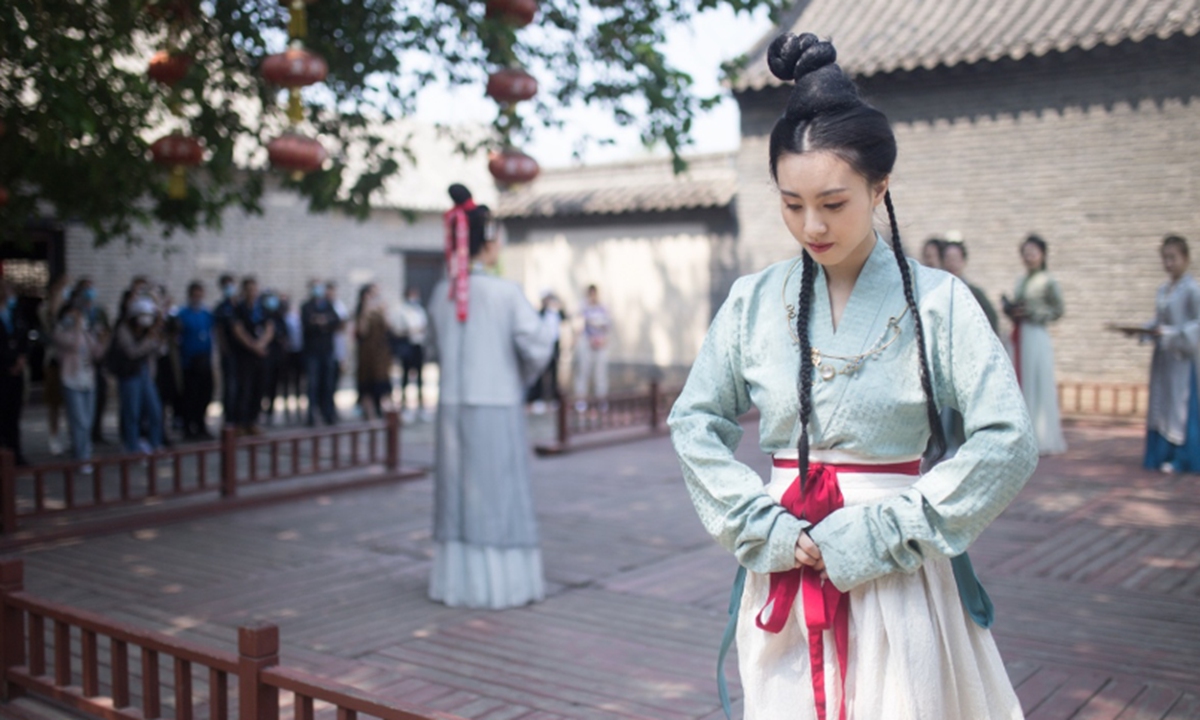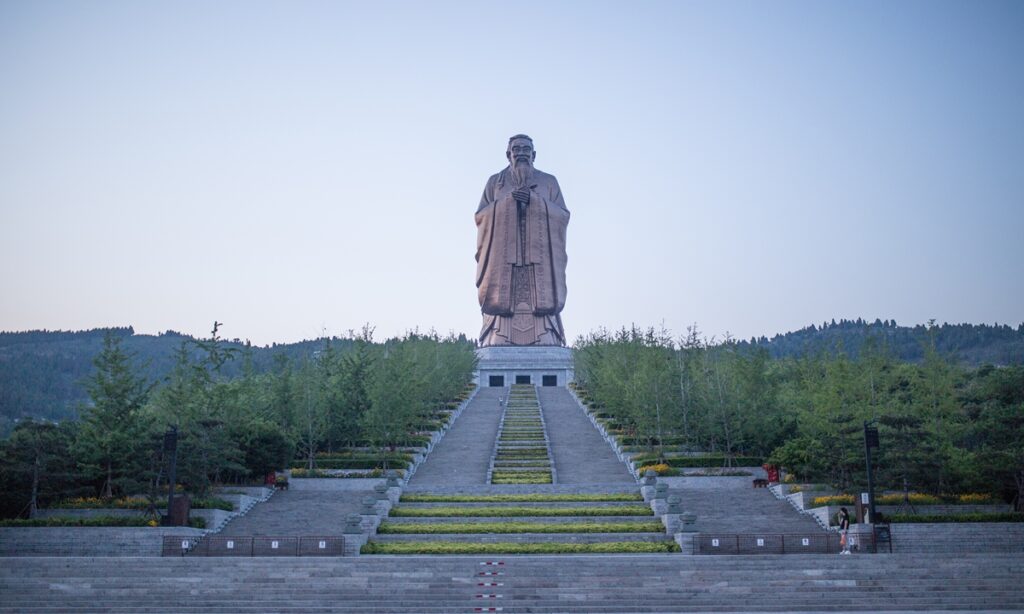In Confucius’ hometown in Jining in East China’s Shandong Province, the morning begins with children reading the great philosopher’s quotes from 2,000 years ago.
“Learning without thought is labor lost; thought without learning is perilous,” students aged 8 or 9 read aloud.
Here, children learn and recite Confucius analects from a very young age.

Students in a primary school of Qufu read Confucius analects in the morning. Photo: Shan Jie/GT
Confucius’ hometown Jining may be less well-known than big cities like Beijing and Shanghai, but it however enjoys the status of a distinguished cradle of Chinese civilization.
Through people’s quotidian life in the city, Confucius’ wisdom and spirit can permeate through every aspect, big or small. It is also an epitome of modern Chinese society, where Confucianism is widely recognized to have defined the spirit of Chinese culture.
“China being China and Chinese being Chinese largely depend on Confucianism. It inserts genes into the Chinese culture,”Liu Xubing, head of Confucius Research Institute in Qufu, told the Global Times.
Martin Jacques, a Senior Fellow at the Department of Politics and International Studies at Cambridge University, believes that the Communist Party of China (CPC) is also rooted in and profoundly influenced by Confucianism.
“From well before 1949, the CPC’s Marxism was highly nativized… It might be described as a hybrid of Chinese Marxism and Confucianism,” he told the Global Times in a previous interview.
Liu believed that Confucianism has a reference signification for the world that is now at an age of turbulence. “We need to cultivate our own garden, but also help those in need… this is the tradition of Confucianism.”
Blessed land of great minds
In the morning, Kong Pan, 32, is ready for her work as a guide at the Temple of Confucius in Qufu.
She is the 75th great-grandchild of Confucius and has been working here for 11 years. For her, stories about and quotes from Confucius have been memorized by heart.
“Confucius’ thoughts are actually very modern,” she said. “He told us to do things in a timely fashion, to do good and live in harmony with nature.”
Today, one out of every five people is a descendant from Confucius in Qufu, and they proudly inherit the treasure of knowledge, etiquette, and a host of other qualities from the remarkable ancestor.
More than 2,500 years ago, Kong Qiu, or later known as Confucius, was born in Zouyi of the Lu Kingdom, which is today’s Qufu of Jining. He set up the first private school in China and had 3,000 disciples, of whom 72 became accomplished. The teachings of Confucius center on peace and social harmony. His proverbs were collected in the “Analects” by his students.
Confucianism, the philosophy formulated by Confucius, has steered Chinese society for more than 2,000 years, and has seen a revival in China, and continues attracting interest from around the world.
Nowadays, the Temple of Confucius and the Kong Family Mansion still sit at the center of the Qufu town and is open to the public who wish to learn about the life and thoughts of the great philosopher.
In Qufu, each of its 405 villages has a Confucianism teacher and a lecture hall for regular classes. These lectures are usually given by retired teachers or prominent figures who know Confucianism. In Shandong Province, nearly 10,000 villages have set up halls for learning about Confucianism.
Only 25 kilometers from Qufu is the birthplace of Mencius, a great philosopher who inherited and promoted Confucianism.
Mencius’ concepts of human nature and his advocacies on politics and education still inspire people around the world today.
In June 1998, former US president Bill Clinton quoted Mencius during his visit to China. “A good citizen in one community will befriend the other citizens of the community … a good citizen of the world will befriend the other citizens of the world,” Clinton used the wisdom of Mencius to describe China-US ties.

Ancient etiquette performance at the Mansion of Mencius in Zoucheng county, Jining. Photo: Shan Jie/GT
Confucianism in a modern day
Through the daytime, thousands of travelers pass through the high-speed train station of Jining.
“It is such a pleasure to have friends coming from afar!” This quotation from Confucius known by every Chinese person now hangs right at the exit at the station, showing the hospitality of the Confucianism.
In the Confucius International School of Jining, Kong Yu, 18, readies herself for her study abroad. “Since I was young, I have been learning about the analects of Confucianism,” she said. “I will keep the principles in mind, and try to practice and promote the essences in the future.”
Modern elements are also added into new Confucianism landscapes.
In Jining’s New and Hi-tech Industrial Zone, cultural and creative companies are making the stories of Confucius into cartoons, some with English subtitles so that children from other countries can learn about the classics of China.
At night, tourists can enjoy fireworks displays and drone shows at Nishan Sacred Land, a new scenic spot in Qufu that features a 72-meter-tall brass statue of Confucius. The fascinating dancing and singing shows there present the story of Confucius and the people.
Modern life did not fade the glory of Jining’s history. People there have been ready to introduce the city to the world with what they have had in the past and what they treasure today.
A 72-meter high Confucius statue stands atop NiShan Sacredland Photo: Shan Jie/GT


